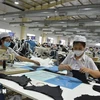The online job market continues to show signs of bouncing back as in the third quarter of 2009 it saw a growing demand for personnel.
Statistics released on Nov. 4 by VietnamWorks.com, the country’s biggest provider of online recruitment services, show that the personnel demand index surged by 11.4 percent against the second quarter.
Up to 24 out of a total of 50 sectors saw demand for personnel rise, while only five industries witnessed their demand fall during the reviewed period. The agro-forestry sector’s job demand index enjoyed the highest increase, double that of the previous three months.
However, VietnamWorks.com also states that the worker supply index had dropped by 2.8 percent from the second quarter. The index grows in seven sectors amongst the 50 sectors.
This trend has helped to narrow the gap between the supply and demand for workers and eases the pressure on job seekers, it said.
VietnamWorks.com’s General Director Chris Harvey said that the recovery of the economy and companies in general has warmed up the job market, with a lot of recruitment taking place.
During the past three months, a new trend regarding the recruitment of senior-level foreign managers has appeared, named ‘employing international staff at local salaries’.
An increasing number of foreigners and overseas Vietnamese have come to Vietnam to find work due to impacts of the global economic crisis. However, the demand for senior level foreign managers is low, therefore the supply index is higher than the demand index.
Despite the narrowed gap between supply and demand, the personnel competition index remained unchanged compared with the previous quarter. Administrative-secretarial work, the import-export sector, personnel management, customer services, translators and interpreters saw the fiercest competition.
However, Harvey said that the competition had created an incentive for workers to pursue their studies further and improve their professional qualifications./.
Statistics released on Nov. 4 by VietnamWorks.com, the country’s biggest provider of online recruitment services, show that the personnel demand index surged by 11.4 percent against the second quarter.
Up to 24 out of a total of 50 sectors saw demand for personnel rise, while only five industries witnessed their demand fall during the reviewed period. The agro-forestry sector’s job demand index enjoyed the highest increase, double that of the previous three months.
However, VietnamWorks.com also states that the worker supply index had dropped by 2.8 percent from the second quarter. The index grows in seven sectors amongst the 50 sectors.
This trend has helped to narrow the gap between the supply and demand for workers and eases the pressure on job seekers, it said.
VietnamWorks.com’s General Director Chris Harvey said that the recovery of the economy and companies in general has warmed up the job market, with a lot of recruitment taking place.
During the past three months, a new trend regarding the recruitment of senior-level foreign managers has appeared, named ‘employing international staff at local salaries’.
An increasing number of foreigners and overseas Vietnamese have come to Vietnam to find work due to impacts of the global economic crisis. However, the demand for senior level foreign managers is low, therefore the supply index is higher than the demand index.
Despite the narrowed gap between supply and demand, the personnel competition index remained unchanged compared with the previous quarter. Administrative-secretarial work, the import-export sector, personnel management, customer services, translators and interpreters saw the fiercest competition.
However, Harvey said that the competition had created an incentive for workers to pursue their studies further and improve their professional qualifications./.



















